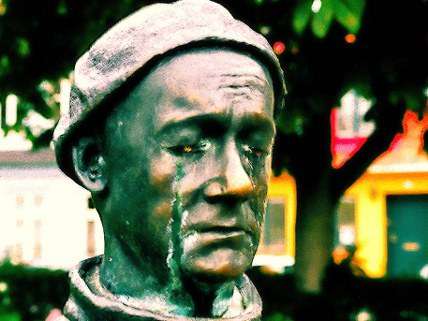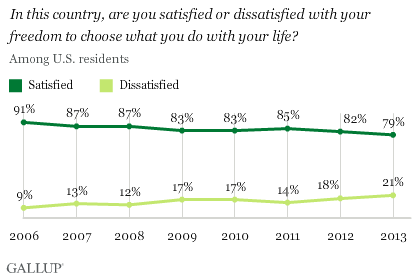Americans Feel Less Free—And They're Right!

Over the past eight years, the share of Americans who feel satisfied with the amount of freedom in their lives has plummeted from 91 percent to 79 percent, according to a Gallup survey. That may explain earlier polling that found widespread perception that the government itself is the largest problem facing the United States.
Public dissatisfaction may also reflect the reality that the country's international rankings in areas including economic freedom, Internet freedom, and press freedom have slipped dramatically in recent years. People feel less free because they are less free.

According to the Gallup write-up:
Fewer Americans are satisfied with the freedom to choose what they do with their lives compared with seven years ago -- dropping 12 percentage points from 91% in 2006 to 79% in 2013. In that same period, the percentage of Americans dissatisfied with the freedom to choose what they do with their lives more than doubled, from 9% to 21%.
Gallup asks people in more than 120 countries each year whether they are satisfied or dissatisfied with the freedom to choose what they do with their lives. In 2006, the U.S. ranked among the highest in the world for people reporting satisfaction with their level of freedom. After seven years and a 12-point decline, the U.S. no longer makes the top quartile worldwide.
At 94 percent and 93 percent respectively, New Zealand and Australia rank at the top in terms of public satisfaction with the freedom to choose what they do with their lives. Australia also ranks third and New Zealand fifth on the Index of Economic Freedom, while the U.S. comes in at 12.
According to the 2014 entry for the United States at the Index of Economic Freedom, "The U.S. is the only country to have recorded a loss of economic freedom each of the past seven years. The overall U.S. score decline from 1995 to 2014 is 1.2 points, the fourth worst drop among advanced economies."
The Fraser Institute's Economic Freedom of the World: 2013 Annual Report (PDF) is even tougher, noting that the U.S. slid from third to 19th from 2000 to 2011. While there was widespread slippage, the biggest problem, noted the report, was with eroding government respect for legal systems and property rights.
Largely because of revelations of U.S. government surveillance of the world at large and Americans at home, Freedom House's Freedom on the Net 2013 dropped this country's ranking on Internet freedom from 12 to 17 last year.
Press freedom has also taken a hit. Last year, the Committee to Protect Journalists cautioned:
U.S. President Barack Obama came into office pledging open government, but he has fallen short of his promise. Journalists and transparency advocates say the White House curbs routine disclosure of information and deploys its own media to evade scrutiny by the press. Aggressive prosecution of leakers of classified information and broad electronic surveillance programs deter government sources from speaking to journalists.
Then, early in 2014, the U.S. slipped 13 places on the World Press Freedom Index, compiled by Reporters Without Borders. The group cautioned that "increased efforts to track down whistleblowers and the sources of leaks…were warnings to all those thinking of assisting in the disclosure of sensitive information that would clearly be in the public interest."
If Americans are increasingly dissatisfied with the freedom in their lives, it may well be because, in many ways, government respect for freedom is slipping away.


Show Comments (62)